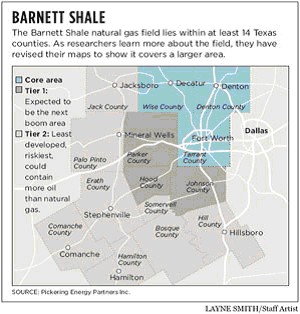UPDATE: The Texas Oil and Gas Association (TXOGA) has filed an injunction in state court in Denton to stop a fracing ban passed by the city. According to the TXOGA petition, “the ordinance … exceeds the limited authority of home-rule cities and represents an impermissible intrusion on the exclusive powers granted by the Legislature to state agencies.” Frac bans have met with limited success in other parts of the country, and it remains uncertain whether Denton’s ordinance with be upheld or overturned.
Denton, Texas is the first town in the heart of the oil patch to say no to hydraulic fracturing.
Yesterday’s voting showed 59% of voters favored a fracing ban in Denton, a city of 123,000 with more than 270 gas wells at the edge of the Barnett Shale play. Energy companies and royalty owners will almost certainly fight the ban in court with arguments that Texas drilling regulations trump Denton’s and that the city was confiscating mineral rights.

Source: www.glenrosearea.com
Earlier in the year, two judges overturned three Colorado municipal fracing bans, based on the same arguments.
Denton was not the only locality to pass frac bans yesterday. California voters in San Benito and Mendocino counties approved a hydraulic fracturing ban, joining Santa Cruz and Los Angeles counties, both of which outlawed fracing earlier this year. A proposed ban in Santa Barbara county did not pass.
Germany’s Proposed Drilling Moratorium Prompts E&P to Drop Licenses There
Across the Atlantic, Rose Petroleum PLC (ticker: ROSE.L) decided to drop its Konstanz and Biberach exploration licenses in Germany, citing a lack of political support for shale gas exploration. Rose decided not to pursue the two licenses, despite promising preliminary results for exploration, because of a proposed moratorium on unconventional drilling in Germany that would bar drilling wells with depths less than 9,842 feet. The two licenses cover 635,000 acres.
The company will retain its third license representing 657,000 acres in the Weidden state, because the area holds conventional targets and has a longer license term, according to PetroGlobal News. Rose holds its other operations in a much more development-friendly region – the Uinta and Paradox Basins of Utah.
Important disclosures: The information provided herein is believed to be reliable; however, EnerCom, Inc. makes no representation or warranty as to its completeness or accuracy. EnerCom’s conclusions are based upon information gathered from sources deemed to be reliable. This note is not intended as an offer or solicitation for the purchase or sale of any security or financial instrument of any company mentioned in this note. This note was prepared for general circulation and does not provide investment recommendations specific to individual investors. All readers of the note must make their own investment decisions based upon their specific investment objectives and financial situation utilizing their own financial advisors as they deem necessary. Investors should consider a company’s entire financial and operational structure in making any investment decisions. Past performance of any company discussed in this note should not be taken as an indication or guarantee of future results.

